
Dear friend of FAI:
I’d like to share with you some of our recent activities, including new analysis from the Research team, project updates from Labs, and other developments across the Foundation for American Innovation.
We were especially excited to feature Marc Andreessen on a recent special episode of our podcast, The Dynamist. Andreessen spoke to Senior Fellow Jon Askonas about his recent Techno-Optimist Manifesto, responded to his critics, and considered technology’s role in accelerating social progress. The episode prompted responses from writer Virginia Postrel, whose 1998 book The Future and Its Enemies inspired the name of our podcast, and a critique from FAI Senior Economist Sam Hammond.
Andreessen’s manifesto offers a forceful revival of late 20th century techno-optimism, quoting heavily from the “patron saints” of libertarian futurism. The manifesto also sets itself up as a rallying point for effective accelerationism, a pro-technology movement that emerged in response to the effective altruism movement and its positioning on the risks of artificial intelligence.
Recently, Sam and I were both interviewed for a Politico report on the two movements. While effective altruism has received some well-deserved criticism—from the collapse of FTX to OpenAI’s board fight—it would be a mistake to ignore the public policy challenges of transformative technologies such as AI. As Sam has argued, even without imagining a Skynet-like AI, we should expect massive institutional, economic, and societal disruption along with its many benefits. Here at FAI, we’ll continue engaging with all sides, and advocating a philosophy that recognizes both the power of technology to create wealth and dynamism, and the need for pragmatic public policy to orient technology towards genuine human flourishing and the national interest.
In other news, we’re looking to expand the FAI team and recently announced an opening for a Manager or Director of Technology Policy. If you’re interested, we encourage you to apply or reach out to us to learn more.
Below, take a look at what else the FAI team has been up to over the last few months.
Research
Our policy team had a busy quarter, working to strengthen national security, improve American governance, and keep America at the forefront of technological dynamism.
Reports, Letters, and Testimony
I spoke at the U.S. Senate's AI Insight Forum on “Transparency, Explainability, Intellectual Property, and Copyright.” I argued that policymakers should prioritize narrow interventions in well-understood areas, as well as building deeper expertise and oversight capacity at agencies and in Congress. For the latter, this should include investing in additional committee staff, increasing funding for support agencies like the Congressional Research Service and Government Accountability Office, and expanding its relationship with the National Academies of Sciences, Engineering, and Medicine.
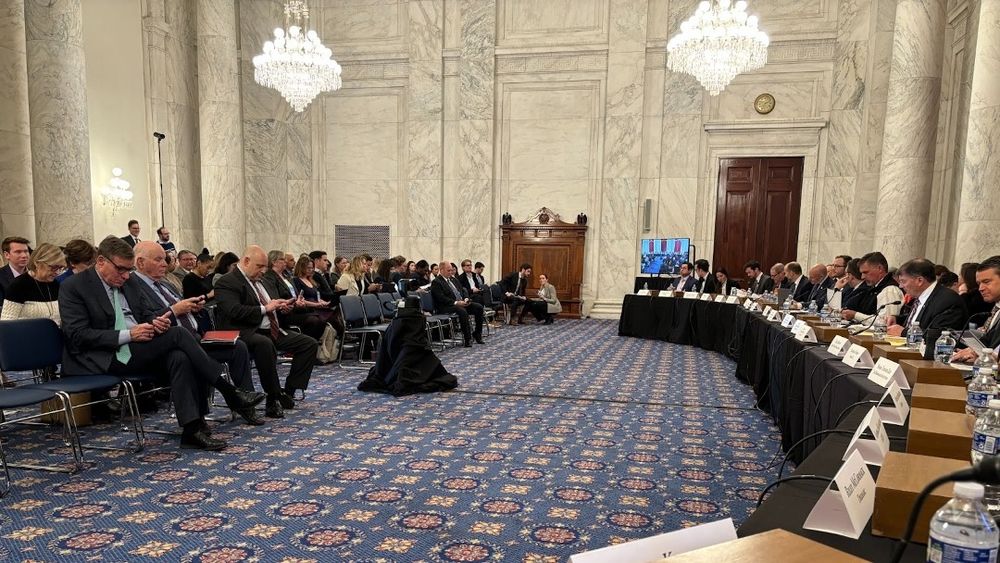
Sam testified before the House Committee on Oversight and Accountability’s Subcommittee on Cybersecurity, Information Technology, and Government Innovation. At the hearing on “White House Policy on AI,” Sam argued that managing AI’s growing throughput demands not only will require the federal government to adopt AI aggressively, but should force Congress and the executive branch to rethink the configuration of our administrative and regulatory agencies from the ground up.
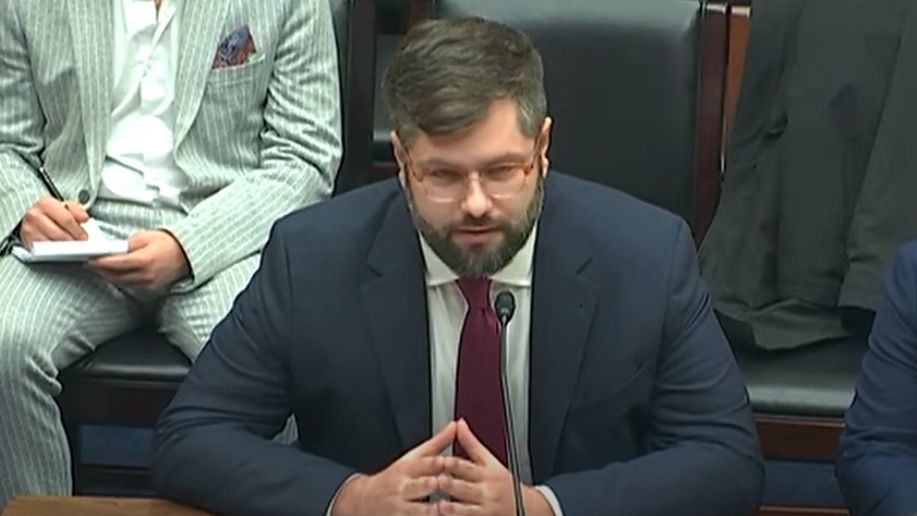
Sam also responded to the Office of Management and Budget’s request for comment regarding the draft memorandum on “Advancing Governance, Innovation, and Risk Management for Agency Use of Artificial Intelligence.” In his comment, Sam reiterated many of the points from his testimony, arguing that with coordination among the White House, OMB, and Congress, we can forestall system failure by co-evolving our institutions with AI, enhancing public trust, and saving taxpayer dollars in the process.
Advisor and former Endless Frontier Fellow Alex Dubin and Head of Policy Dan Lips published a paper, “Satellite Internet Technology: Opportunities to Close the Digital Divide and Promote Internet Freedom,” which considers how satellite internet can help close the global digital divide and promote internet freedom. Their assessment of current satellite internet technology and the U.S. government’s ongoing efforts to promote global internet freedom show how delivering internet access by satellite could advance long-standing national objectives, especially as China promotes its own global technology development strategy.
Dan and Research Manager Robert Bellafiore published a report, “Reforming the Education Sciences Reform Act: Improving K-12 Education Through Federal R&D.” The 2002 law, which reformed and authorized the federal government’s approach to education R&D, is due for congressional reauthorization. Building on the Senate Health, Education, Labor and Pensions Committee’s recent work on a reauthorization bill, Dan and Robert assess the performance of current federal education R&D efforts and offer recommendations for how Congress can improve the return on investment from federal education research.
In the fall issue of the New Atlantis, Policy Technologist Lars Erik Schönander contributed an essay on how revolutions in space, imaging, and AI could open up satellite surveillance to the masses. He discusses how satellite intelligence capabilities that were once restricted to classified government agencies may soon be available to anyone with an internet connection.
In the fall issue of City Journal, Robert contributed an essay on New York City’s recent overheal of its literacy curriculum. He argues that the positive move from the debunked “balanced literacy” to an emphasis on phonics reveals the need for not just good education R&D, but also an effective research-to-implementation pipeline.
Our team contributed three essays to the winter issue of American Affairs. Research Associate Thomas Hochman’s essay, “It’s Not Just NEPA: Reforming Environmental Permitting,” discusses how the Clean Air Act has become a massive regulatory barrier to the U.S. semiconductor industry, and shows how reforming our environmental policies would boost manufacturing. Lars’s essay, “Drone Policy in the U.S. and Ukraine: Addressing Foreign Control of a Key Technology,” considers the Ukrainian and U.S. experiences with Chinese drones and industrial policy, offering lessons on how to respond to the foreign sabotage of critical technologies. And Jon’s essay, “Technological Stagnation Is a Choice,” reviews Vaclav Smil’s new book, Invention and Innovation: A Brief History of Hype and Failure, and argues that the book’s story is one, not of failed innovation and hype, but of human ingenuity and failure of imagination.
FAI joined forces with POPVOX Foundation to create a suite of tools to bring congressional staffers up to speed on AI's application in congressional workflows. The first component of this series is a short guide to the risks and benefits of these new tools, and best practices for their smart and safe adoption. We’re looking forward to releasing further tools in the coming months.
Media Fellow Evan Swarztrauber was a signatory on a letter sent to Secretary of Commerce Gina Raimondo, expressing concern with the Biden administration’s disregard for congressional intent in its efforts to impose rate regulation on broadband internet access service. The letter argues that despite a clear congressional prohibition on rate regulation in the Infrastructure Investment and Jobs Act, the National Telecommunications and Information Administration has ignored the law and imposed price controls on broadband.
We signed on to a letter sent to members of the House of Representatives urging strong reforms to Section 702 of the Foreign Intelligence Surveillance Act, which has enabled warrantless digital surveillance of U.S. citizens for decades. Speaker Johnson may finally end a long history of abuse and reform this law, and we’re happy to support this change. The Protect Liberty and End Warrantless Surveillance Act would require a warrant for dragnet digital surveillance and would reform the third-party doctrine to end the practice of warrantless data broker purchases by federal agents. While Congress has moved forward with a temporary extension of the existing authorization, we look forward to engaging around the expiration of this authorization.
We submitted comments to the Federal Communications Commission opposing the agency’s proposed reimposition of Title II regulation of broadband Internet access services, better known as net neutrality. We encouraged the FCC to end its rulemaking and return to such vital efforts as spectrum reauthorization, reform of the universal service program, and broadband deployment.
Board member Michael Kratsios testified before the House Committee on Science, Space, and Technology Subcommittee on Investigations and Oversight and Subcommittee on Research and Technology. At their hearing on “Balancing Knowledge and Governance: Foundations for Effective Risk Management of Artificial Intelligence,” he discussed the importance of adopting use case- and sector-specific, risk-based guidelines for responsible AI deployment. The next day, Michael appeared on FOX Business to discuss how the U.S. can protect AI from Chinese theft.
Commentary and Impact
Many policies that our scholars have advocated for saw progress this quarter.
Lars has warned about Chinese state-owned companies owning U.S. farmland and called for greater oversight of land acquisitions by foreign entities. In October, Arkansas Governor Sarah Huckabee Sanders announced that as the result of a state law passed earlier this year that bans ownership of agricultural land by prohibited foreign parties, the Chinese state-owned corporation Syngenta must sell more than 100 acres of agricultural land in the state.
Lars has also written about the dangers of the U.S. government’s use of Chinese drones, especially from the companies DJI and Autel. We’re excited by the recent introduction of the American Security Drone Act of 2023 by Representatives Mike Gallagher, Rob Wittman, Joe Courtney, and Raja Krishnamoorthi. The legislation would prohibit the federal government from procuring drones manufactured by countries identified as national security threats, including China. This bill was included in the National Defense Authorization Act that passed in December. In another important step, Representatives Gallagher and Krishnamoorthi, together with other members of Congress, recently sent a letter to Biden administration officials, urging the administration to open investigations into Autel.
In November, the House passed its legislative branch appropriations bill, which we worked on during the bill’s inception and championed through the legislative process. Leading up to the vote, we led a coalition letter expressing our support for the bill, arguing that it “strikes the right balance between fiscal responsibility and ensuring that the legislative branch has the appropriate resources to execute its constitutional responsibilities.” We were especially happy to see this measure pass in a bipartisan manner, with four Democrats joining a unanimous Republican Conference.
The House Commerce, Justice, Science, and Related Agencies appropriations bill shows a growing awareness of the technological dimension of U.S.-China competition, which we have written widely about, and reflects several of our institutional priorities:
- Supporting investments in research, development, and industrial policy in emerging areas such as AI, quantum computing, and advanced manufacturing to counter China’s own investments in R&D.
- Supporting the Artemis program, which, as Alex has argued, will be crucial to maintaining U.S. leadership in space exploration.
- Granting the National Science Foundation a 9 percent increase in funding to support the above priorities.
- Flat funding for the Bureau of Industry and Security relative to other agencies’ budget cuts. As Sam has written, BIS plays an important role in “promoting continued U.S. strategic technology leadership.”
- Limited cuts in funding for the National Institute of Standards and Technology relative to other agencies’ budget cuts. This is in line with our consistent support for the agency as a neutral arbiter of tech standards.
Dan and Lars have warned about U.S. higher education’s vulnerability to foreign, and especially Chinese, influence. In particular, they have called for reforms and greater enforcement of Section 117 of the Higher Education Act of 1965, which requires postsecondary institutions to disclose payments from foreign sources. We were pleased to see that the U.S.-China Economic and Security Review Commission, in its recent annual report to Congress, recommended several aligned changes to Section 117 to protect U.S. universities and colleges from malign foreign influence. Additionally, the House recently passed the DETERRENT Act, which would require stricter reporting standards for foreign gifts, donations, and investments. It would also strengthen the punishment for noncompliance. We were happy to support this measure while it was in the House and hope it is taken up by the Senate.
Robert and I have argued for the value of a well-designed education ARPA, modeled on the Defense Advanced Research Projects Agency. To that end, Representatives Brian Fitzpatrick and Suzanne Bonamici recently introduced the New Essential Education Discoveries Act of 2023, which would create a DARPA-inspired National Center for Advanced Development in Education. Dan and Robert signed a letter submitted to Representatives Fitzpatrick and Bonamici in support of the legislation.
The House Select Committee on Strategic Competition between the United States and the Chinese Communist Party’s recent major report incorporates several of our recommendations, including a broad call for the U.S. to “invest in American innovation.” It calls for strengthening Section 117 and for restricting U.S. federal agencies from procuring drones manufactured in China and other “foreign adversary countries.” It also calls for a forced divestment of TikTok, in line with former Senior Fellow Geoffrey Cain’s argument that the app is a serious national security threat.
Our commentary included the following:
- Roslyn Layton, “Netflix, Korea Broadband Settlement May Signal Funding Trend,” in Bloomberg Law
- Roslyn Layton, “Stop Ignoring the SEC’s Malfeasance on Crypto,” in RealClearPolicy
- Luke Hogg, “Lina Khan Concocts Market Definitions That Defy Reason,” in RealClearMarkets
- Richard Reisman, “How Third-Party Social Media Middleware Can Protect Contextual Privacy,” in Tech Policy Press
- Luke Hogg, “Revolutionizing Agriculture Requires Rethinking Rural Connectivity,” in Tech Policy Press
- Thomas Hochman and Lars Erik Schönander, “Congress Should Expand the Use of Categorical Exclusions,” in The Hill
- Robert Bellafiore, “Congress’s Watchdog Offers a Test for Republicans,” in The Hill
- Dan Lips and Satya Thallam, "Congress Needs to Assert Authority over Government Regulations," in The Hill
- Lars Erik Schönander, "Congress Must Track Foreign Money in Higher Education," in The Hill
- Robert Bellafiore, “John Gray’s Postliberal Prophecies,” in the American Conservative
- Max Bodach, “Maniacal Visions,” in Plough
- Robert Bellafiore, “Learning from the Luddites,” in the Washington Free Beacon
- Luke Hogg, “Crypto Can Help Make Government Better,” in the Washington Examiner
- Jon Askonas, “The Sacred Mysteries of Adam Smith,” in FUSION
- Antonio García Martínez, “The Dogs of War,” in Tablet
- Roslyn Layton, “CPUC Actions Threaten to Widen, Not Close, the Digital Divide,” in Capitol Weekly
- Dan Lips, “Why Congress Must Push its Watchdog to Achieve Taxpayer Savings”
- Dan Lips, “A Promising Partnership to Improve Research and Innovation”
- Dan Lips, “How Technology Can Help Parents Access Education Choice Options”
- Sam Hammond, “Unpacking the Bias in Claims of AI Bias”
- Dan Lips, “Congress Should Require the National Center for Education Statistics to Publish Timely Data”
Sam has been writing about AI’s implications for economic growth and other effects of AI on his Substack, Second Best.
Highlights among our media hits included the following:
- Sam spoke to FOX News about the plausibility of a Terminator-style future for AI.
- Luke spoke to DC Journal about the U.S. Securities and Exchange Commission’s misguided anti-crypto bias.
- Sam spoke to Politico about OpenAI CEO Sam Altman’s influence on the broader debate over the existence and risks of AI.
- I also spoke to Politico about Congress’s reliance on corporately funded technologists and the problems it reveals about the legislative branch’s institutional capacity.
- Sam spoke to TIME about President Biden’s AI executive order and the limits of what the government can demand from AI companies.
- I spoke to Politico about how Altman’s exit and return to OpenAI could influence DC’s perceptions of AI.
Fellowships
In June, we completed our third cohort of the Policy Hackers Fellowship. Policy Hackers is a non-resident fellowship program for tech professionals looking to build expertise in the theory and practice of public policy. Over the year-long program, we teach fellows the fundamentals of policy entrepreneurship and innovation policy and introduce them to scholars, government policymakers, and public relations experts. Applications for our fourth cohort are open now. More information is available here.
Labs
2023 has been the breakout year for our Labs team, whose mission is to bring technology and creative partnerships to bear in solving high-stakes problems facing our country. This year, we’ve made more progress than ever. Our biggest successes have come through Schoolahoop, our platform for school choice. Schoolahoop helps parents find, select, and enroll their children in the best schools, as well as find scholarships to help them pay for it, thanks to the wave of education savings accounts moving across the country.
Schoolahoop
Schoolahoop simplifies the process of identifying the right schools by helping parents find relevant schools and scholarships, connecting them to program administrators, and showing parents what options fit their needs. In 2023, Schoolahoop saw its user growth increase nearly 2,500 percent, and reached about 10 percent usage of all families with K-12 age students in Florida. The adoption and usage in Florida, and the success of the various scholarship and choice programs in the state—doubling from roughly 250,000 participants in 2022 to roughly 500,000 participants in 2023—makes us even more confident that Schoolahoop is a tool that every state needs.
In another important development, Schoolahoop is now bilingual, with all its features available in Spanish. You can see it in action here.
We’re also excited about new partnerships and expansions to new states. We recently formed boots-on-the-ground partnerships with GuidEd in Florida and San Juan Diego Institute in Arizona, to support families whose first language is Spanish. We recently launched Schoolahoop in West Virginia to drive awareness of the state’s school choice programs and education savings accounts.
We have big plans for 2024. Our team is working on launching in Iowa and Missouri early next year, and we’re building a “Claim Your School” feature that will allow school administrators to claim their profile and update it real time. In the meantime, you can listen to Labs Head of Product Brandon Detweiler’s recent appearance on Voices of Freedom, the podcast of the Bradley Foundation.
BIPBounty
BIPBounty is the first platform for crowdsourcing tax-deductible bug bounties for Bitcoin Improvement Proposals (BIPs). We’ve received 1.31 BTC in bounty program donations so far, and we recently paid out our first bounty for a proposal that we received for BIP-119 CTV. In 2024, we plan to add new BIPs to the platform and explore additional opportunities with Bitcoin founders and influencers to create tax-deductible ways of supporting Bitcoin R&D projects.
Project Nickel
Project Nickel is our platform for parents, journalists, and policymakers who want to see what public schools spend and where their money goes. Our goal is to increase transparency and awareness in K-12 education spending nationwide because we believe it should be easy for the public to know how much money is being spent by our public school system. Project Nickel has been a valuable resource and tool for policymakers on the Hill working to raise awareness of education spending and boost the return on investment of public education funds.
Events
This quarter, we hosted events across the country with some of our favorite organizations and thinkers.
In November, we held an event at Microsoft’s Innovation and Policy Center in Washington, DC to discuss “AI & the Creator Economy: Dark Age or Digital Renaissance?” Laurent Crenshaw, Senior Director of Policy and External Affairs at Patreon and FAI board member, joined speakers from the U.S. Copyright Office, Stand Together, and New Frontier Ventures to consider potential artistic and public interest applications of AI.
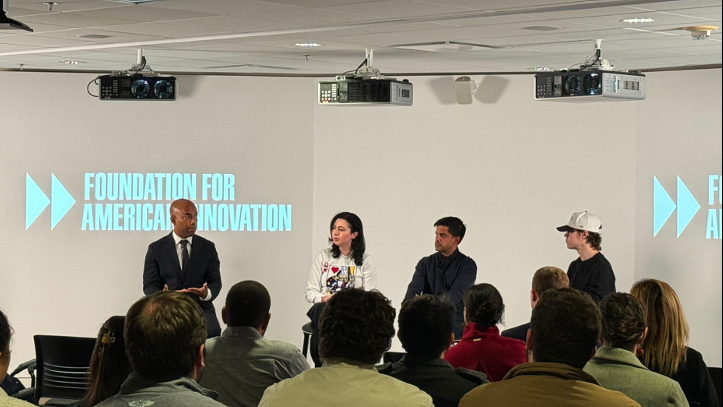
The same day, we partnered with the Aspen Strategy Group for a salon dinner on education R&D. The conversation focused on Aspen’s recent paper, “Re-Engineering American Security: Cultivating Talent for Competitiveness,” to which Dan was a signatory.
In San Francisco, we hosted “From Tech to Government and Back Again,” a conversation at the Internet Archive moderated by Media Fellow Marshall Kosloff. Michael discussed his work as former Chief Technology Officer of the United States, and now as Managing Director of Scale AI, while Jennifer Pahlka, author of the new book Recoding America: Why Government Is Failing in the Digital Age and How We Can Do Better, shared her experience as former Deputy Chief Technology Officer of the United States.
We also hosted a private networking reception with Michael the following day in San Francisco.
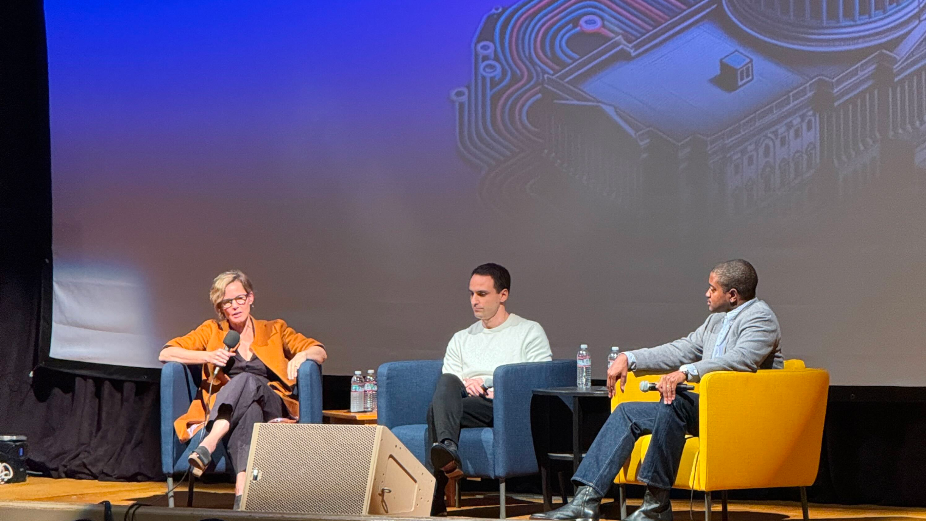
Other highlights among the events our scholars spoke at included the following:
- At the Intercollegiate Studies Institute’s American Economic Forum, Sam and Jon spoke on a panel about AI and the questions it raises about computers and humans.
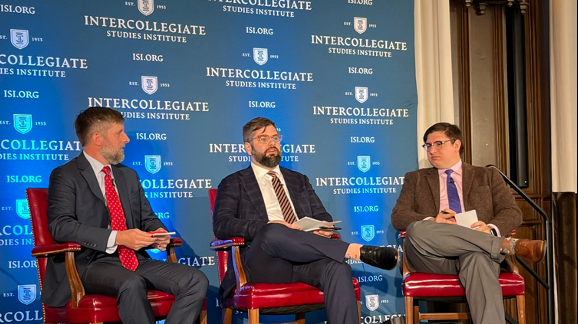
- At the Novitāte conference at Catholic University, devoted to the thought of philosopher René Girard, Jon gave a lecture on “René Girard and the Eschatological Problem of Technology.”
- Jon spoke on a panel at The Heritage Foundation about “AI & Human Flourishing: A Pipe Dream?”
- Sam spoke to the National Conference of State Legislatures about how state legislatures can use AI in the legislative process.
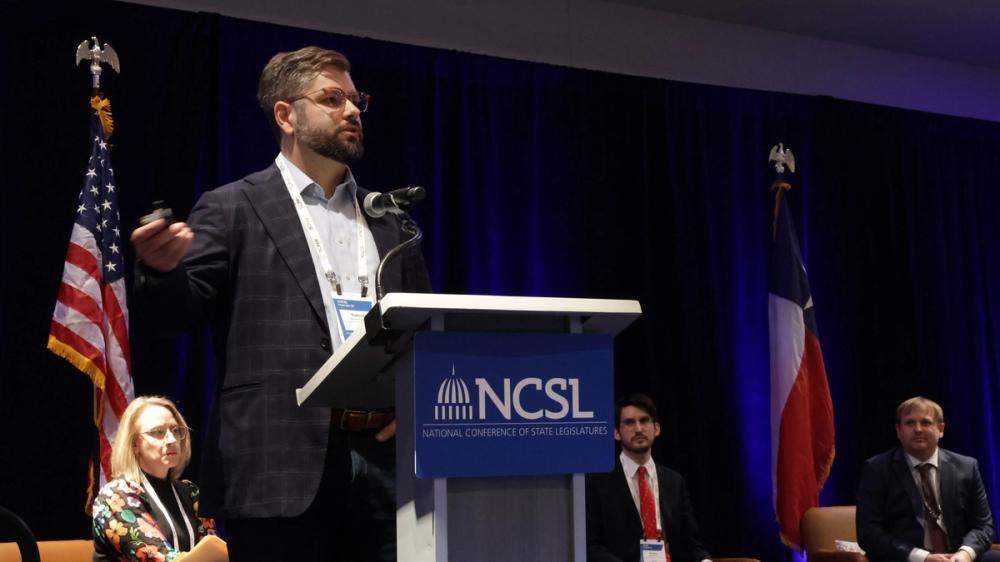
Podcasts
On our podcast, The Dynamist, Evan brought on some of today’s most important thinkers and doers to discuss the future of technology, governance, and innovation. Along with Marc Andreessen, as noted above, recent episodes have featured Onni Aarne and Erich Grunewald of the Institute for AI Policy and Strategy, Brian Chau of Alliance for the Future, and Tom Johnson, former general counsel for the Federal Communications Commission.
Marshall and Saagar Enjeti have continued hosting the podcast The Realignment, which is sponsored by FAI. They’ve had conversations in recent months with figures such as Gilman Louie, CEO and co-founder of America's Frontier Fund; Stuart A. Reid, Executive Editor at Foreign Affairs; and Nikhil Goyal, former Senior Policy for Education and Children for Senator Bernie Sanders.
Book Recommendations
The FAI team has been getting into some great books in recent months. Here are a few that we recommend:
- American Genesis: A Century of Invention and Technological Enthusiasm, by Thomas P. Hughes
- Rise of the Machines: A Cybernetic History, by Thomas Rid
- On War, by Carl von Clausewitz
- Kafka on the Shore, by Haruki Murakami
- The Master Switch: The Rise and Fall of Information Empires, by Tim Wu
- My Struggle: Book 6, by Karl Ove Knausgaard
- The Invention of Tradition, by Eric Hobsbawm and Terence Ranger
- Operation Paperclip: The Secret Intelligence Program that Brought Nazi Scientists to America, by Annie Jacobsen
- Galatea 2.2, by Richard Powers
- The MANIAC, by Benjamin Labatut
- The American Political Tradition: And the Men Who Made It, by Richard Hofstadter
- Pillars of the Earth, Ken Follett
- Romney: A Reckoning, by McKay Coppins
- Skunk Works: A Personal Memoir of My Years at Lockheed, by Ben R. Rich and Leo Janos
- American Pastoral, by Philip Roth
You can also see a longer list of our recommendations on our Bookshop page.
Coming Soon
We have many projects in the works and are excited about the next few months. We’ll be publishing reports on the history of network neutrality, the principles behind conservative futurism, and more, and we’re planning events in New York City, Austin, and San Francisco. Looking further ahead, we’ve got big plans to celebrate our 10th anniversary next fall in San Francisco. Stay tuned for details in the coming months!
Thank you for following our work. We appreciate your continued interest in FAI and welcome any questions or feedback.
If you’re interested in supporting our mission, you can donate here.
Sincerely,
Zach Graves
Executive Director
Foundation for American Innovation